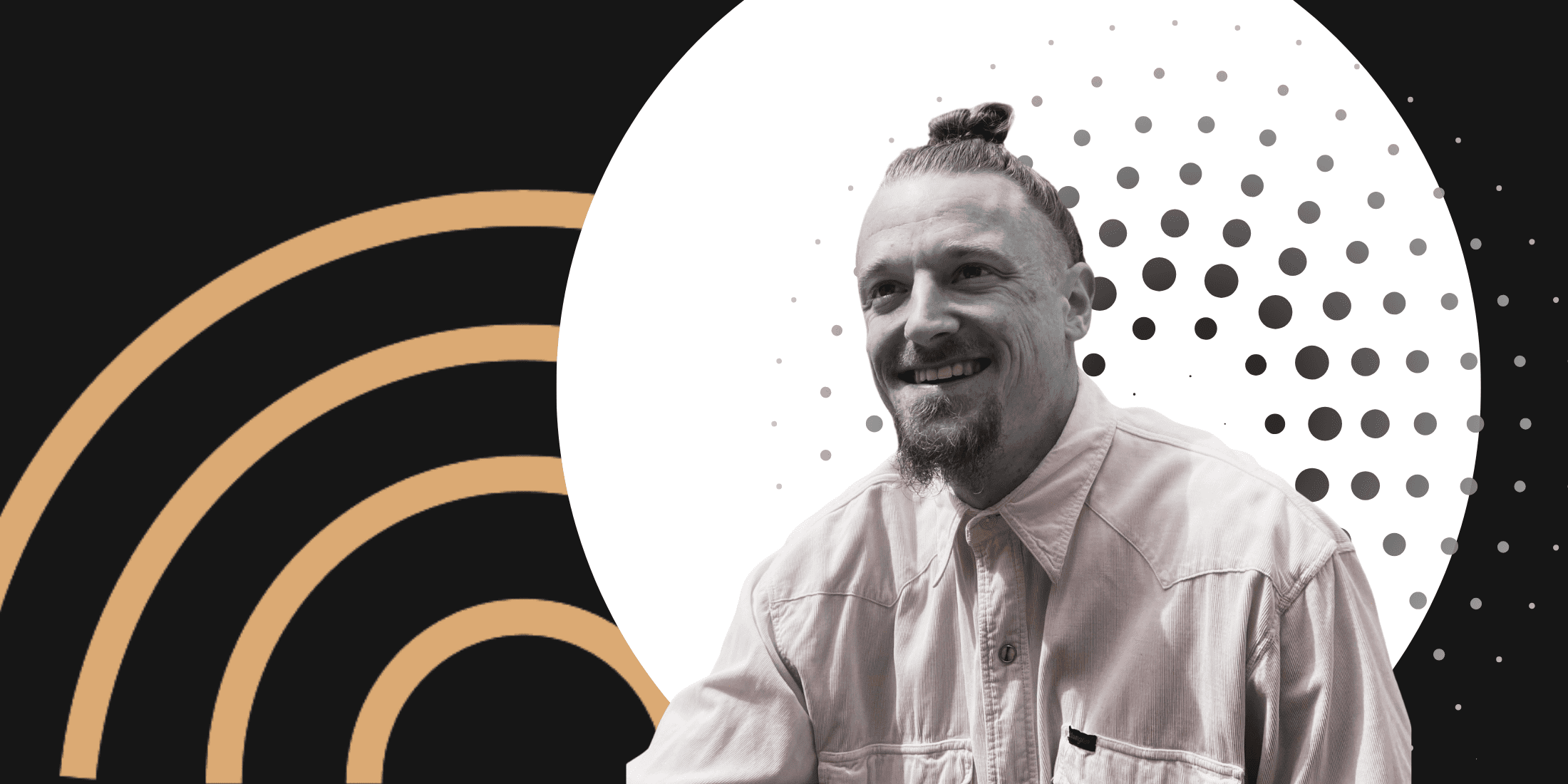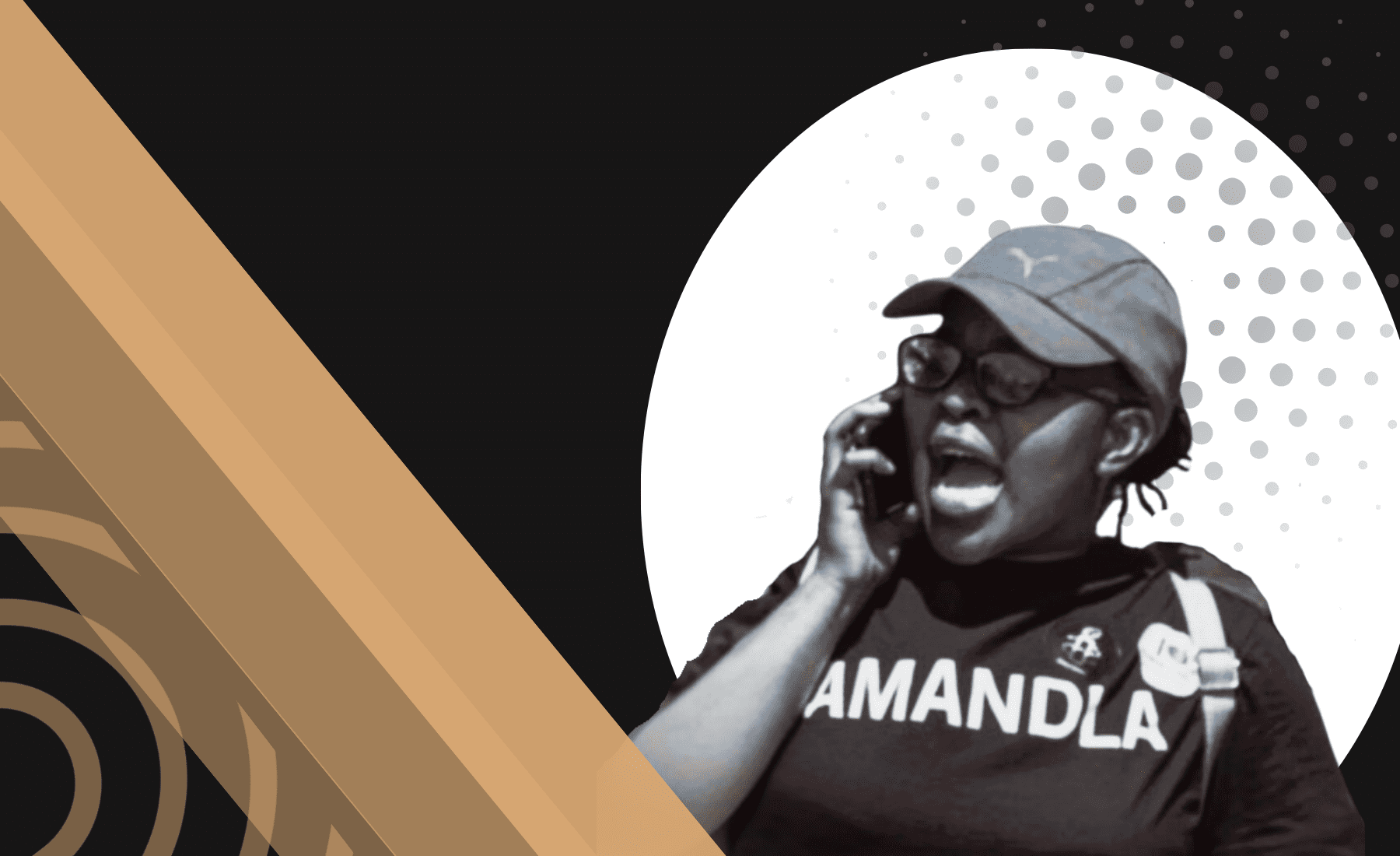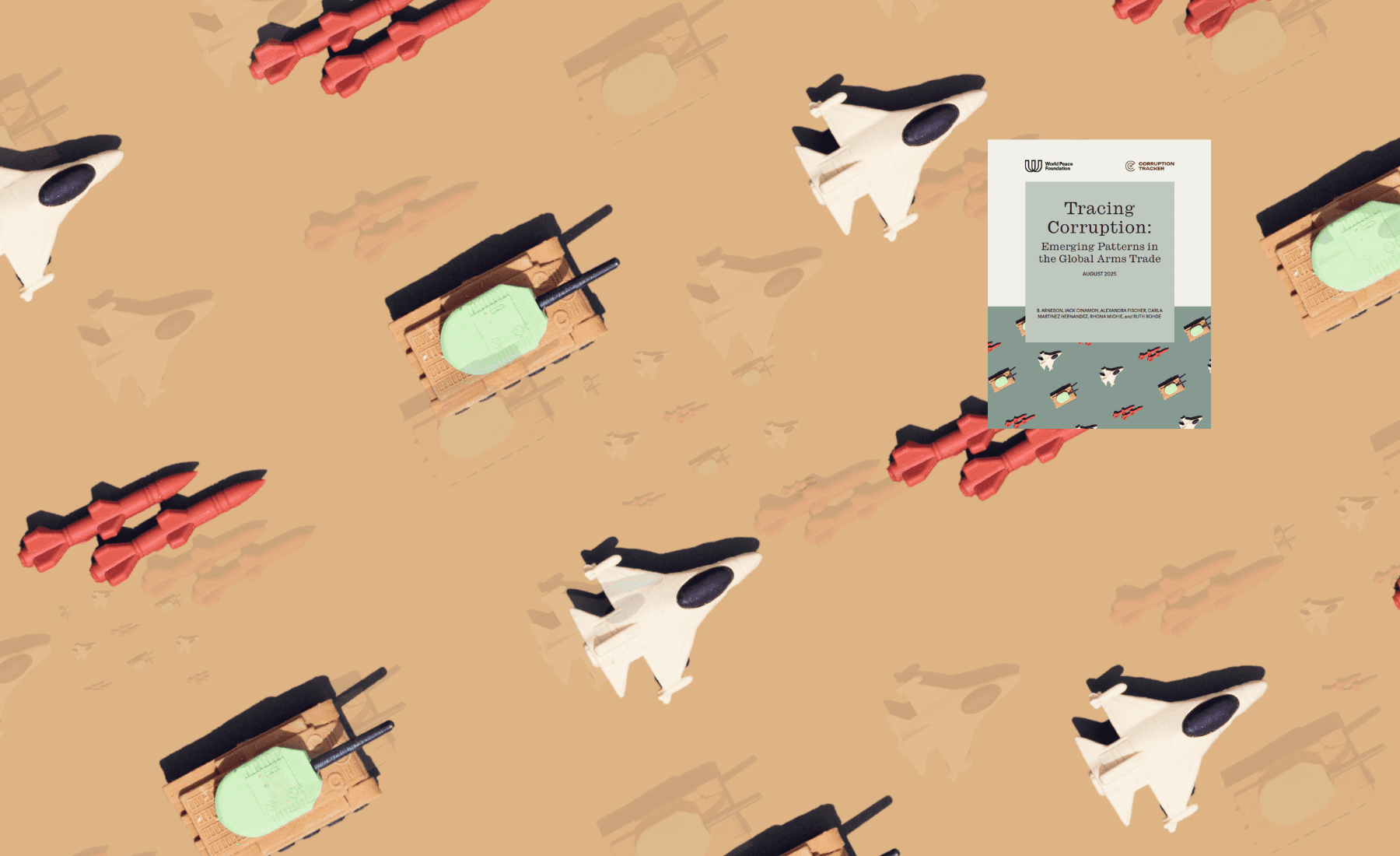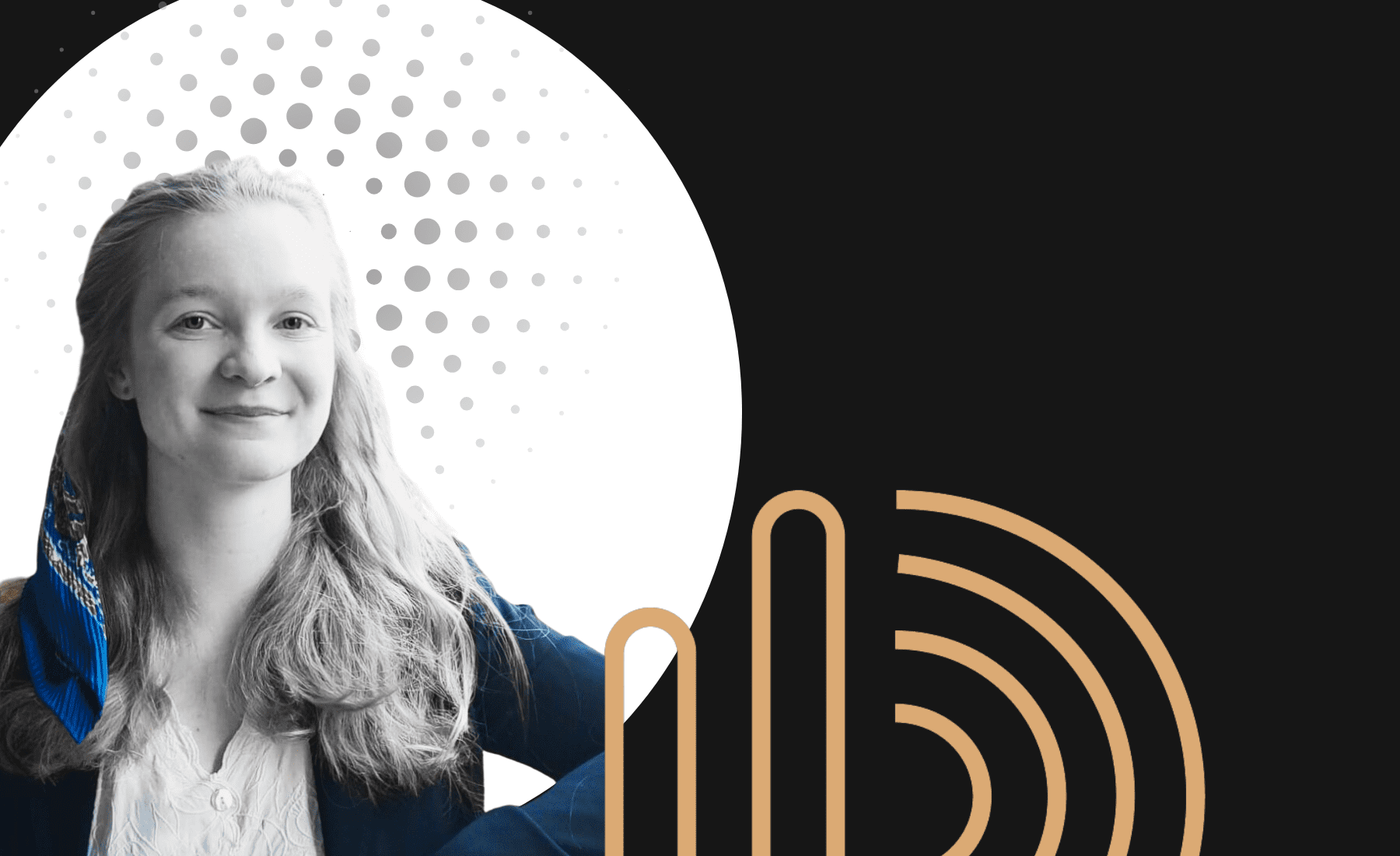In this interview, WPFs Research Director, Bridget Conley, talks with Jack Cinamon, who works with our partner organization, the Corruption Tracker. They discuss how Jack got involved in doing research on corrupt arms deals, what surprised him about the work, and what impact he hopes to make.
Bridget Conley: The corruption tracker is a woman and youth led project that seeks to delegitimize and dismantle the arms trade using the lens of corruption, it aims to collate document and expose information on corruption in the arms trade. By doing so, the corruption tracker team hopes to be an invaluable and accessible resource for campaigners, journalists, human rights organizations and researchers working to dismantle the global arms trade. Within that work, Jack, what is your role?
Jack Cinamon: I am co-Research Coordinator with another fantastic researcher, called B. Arneson, who you might know quite well. It’s a lot of organizational work, but also deep dives and some more open source investigations into certain arms deals, looking at cases and also engaging in blogs and working with other researchers and the rest of the team.
Bridget: What are some of the challenges of doing research on corruption in the arms trade?
Jack: There’s a lot of challenges. I would say probably the biggest challenge is that the majority of information is not widely available, obviously, as with corruption, it’s embedded in so many different spheres: it goes into the political sphere, into the private sphere, and all those lines blurred in between. And so information is not easily accessible because sometimes it hasn’t been exposed or if it has been exposed, sometimes it’s not been sufficiently reported. In the rarity that the case goes to court, some of the testimonies and the information provided in the court documents, is also not to the standard which we hope it should be. So, probably the biggest challenge is a limited amount of information. But with social media and the internet ever-expanding, there’s new opportunities there.
Bridget: On average, how long does it take to produce one of these case studies of a corrupt arms deal?
Jack: it could be quite different depending on the case. I’ll use the example of the Bob Menendez case, the Halal Meat Scandal, in which Bob Menendez accepted quite a lot of money. It was pretty obvious that he was under some sort of payment when law enforcement entered his house and found gold bars in his jacket, which isn’t a normal thing for politicians. Because of the indictment and the documents that were available, you can just follow that kind of template and most of the information was available in that case. But there’s been other high-profile cases which are not as digestible.
I can use the Bofors Scandal in India, which involved Swedish howitzers sold to India, and a lot of kickbacks and quite a lot of corruption, and it still affects the politics in India to this day. That one included hugely extensive information. So it was more about making the information more concise, which was also a big challenge. And that took quite a few months, and I was working on that with a former colleague of mine, Devon van der Poel. But then there’s also some cases where you would actually go into further investigation with international partners and colleagues.
I can use the example of Australia’s Adelaide-class Sustainment Contracts, which involved British company BAE Systems, selling frigates to Australia, and the corruption involved in the sustainment contracts to follow. With this case, as I was explaining before, the information isn’t that clear. You see a gap for further investigation. We went through months of freedom of information requests, international partners, and talking to people involved in the case, but still the Defense Department in Australia were just delaying the whole process. We have something waiting with the commissioner, yet that has a two year waiting list, apparently at the moment.
Another recent case that I worked on called Taiwan’s Lafayette Frigate and Mirage Scandal. It was a wild case, because there are some court documents out there, but still the reporting sent me down rabbit holes, and once you enter this zone, you’re just never going to be satisfied with the final result. There were eight suspicious deaths to do with this corruption case. When you hear about some of the deaths like, a former French intelligence personnel falling out of a six story window, or Taiwanese investigators being found floating in the coastal waters, apparently, without having any water in their lungs, showing that they didn’t drown. You’re not really happy with the fact that those haven’t been investigated. But still, we have to arrive at an end point, the job is to document the corruption scandal. So the length of investigations is very different — it could be months or it could be a week.
Bridget: How did you get started working with the CT? What drew you to these issues into this organization?
Jack: I can go back to when I was young. I’m from London, born and raised, and the area I grew up in was very diverse. A lot of my friends were from Somalia, Afghanistan, Southeast and South Asia, and more. I was forced to not be the typical English kid. A lot of them are second generation immigrants or from families of refugees. So I wanted to learn of their background and understand a lot more. Once you get into the political, or geopolitical world, you get a bit obsessed with reading and for me it was a big awakening to discover the lies we were constantly being told. Because of where my friends were from, like Afghanistan and Iraq, they were quite big moments. I was still young, born in ’94, but it resonated a lot. These were the ‘forever wars’, of our generation growing up, you know? Spanning almost two decades.
Because of my interest in human rights and politics. I went to Liverpool University to do my undergraduate, and mostly focused on human rights law and criminology. Then I went to SOAS and studied post graduate degree in development studies, but I focused mostly on war and conflict and its relationship with corruption. I was really interested in the way that corruption was such a detriment to development and it turns out that the most corrupt sector of global commerce is the arms trade. In my dissertation, I focused on the South African arms deal and its effect on human development. I met with Andrew Feinstein, who was obviously a big part of that arms deal scandal. We ended up speaking for about two or three hours at a cafe in Camden. I thought he was going to stay for about 20 minutes, but he was very generous with his time. Through that connection, I was connected to Ruth, Rhona, Julia and B, and the rest of the Corruption Tracker team. I ended up joining in maybe November 2021 after briefly speaking with Julia.
Once I was in and met the team, I felt like it was such a safe space, but also people were really similar politically, and were angry with the arms trade. They wanted to do something about it. I was just really excited to be part of that. I love what we do at the CT and I think it’s an amazing team. And I think our output is great, politically speaking: it’s a really important voice.
Bridget: Have the issues that concern you shifted at all or changed over the time that you’ve been working on corruption?
Jack: I used to think that they were big problems, obviously, otherwise I wouldn’t have wanted to get involved in this. But the research at CT and Shadow World Investigations (SWI), it’s solidified everything you know 100 times. Because it’s just provided me with so much more evidence to support the knowledge that corruption is such a detriment to development and the arms trade is a massive part of that. And it’s not just the corruption. The CT uses corruption as a lens to advocate against militarism and war, etcetera. I think it’s a really important starting place to show that politicians are basically feeding this war machine through the arms trade, and it’s morally depraved that certain people are able to get extremely wealthy off of it.
Bridget: Has anything surprised you along the way? I mean, for me, when I read the work that that you guys do, or, you know, we read reports from other colleagues who are working in this area, I am — no matter how many I read — still floored at how shameless and unregulated the trade is, and how it grows on these myths that are unsustainable when you poke at them. But for you, has there been anything that’s been particularly surprising, either a fact about a case or overall impressions?
Jack: I can talk about cases, because every case is shocking, while some I would say, are absolutely mad. But away from the cases, I would say we have this very strong belief that the arms trade and its global influence, is a bad thing, you know? And, of course, I’m not like a pacifist per se or anything like that. I believe that people should be able to defend themselves when necessary. But in terms of people’s general thinking: nobody seems to question the arms trade. What shocks me are people’s incapacity to critically think about the arms trade. The anti-war, anti-militarist, arms trade community, whatever you want to call it, is relatively small, and I think it’s grown a lot during the Gaza genocide but outside of that community, outside those people who may have geopolitics interests, or are involved in activism, people still think that the arms trade is a good thing, because it provides jobs, boosts the economy and because Putin is on our doorstep. Keir Starmer is still spouting the same reasoning to increase his defense budget. It’s probably the same thing in the U.S. Donald Trump just had this massive, one big beautiful bill that’s increasing defense spending to $1 trillion. That is the one thing that shocks me, is that people haven’t changed their mind. It’s so hard, even close friends or family members you end up arguing with because you’re trying to provide evidence for what may be an opposing view, but they’ve already made their mind up. Yeah, and I think that’s the most shocking thing. I would say. Because once you start investigating corruption and start reading more about it — I don’t think any plot in any film is going to impress you anymore, because I think the real world is so much crazier.
Bridget: That’s interesting culturally. The arms trade is at the center through the entire Marvel enterprise with Tony Stark …that’s maybe the most popular. It presents the world as if the arms trade is a smooth, seamless contribution to security. And I think what you guys do is really show no, there’s a thousand rough edges behind this veil of national security, there’s so much corruption and so much harm being done, even before a bomb falls.
What would you like the impact of your work to be?
Jack: I would like the impact to be able to expose the crimes of the exploiters. It could be politicians, it could be billionaires that are basically siphoning their money off into tax havens and the intermediaries that are so happy to destroy people’s lives in return for a quick dollar. I would like for the immorality to be exposed — not only character assassination, because it’s a whole system. But you can’t really fight the whole system unless you’re able to expose what people are getting away with within that system. If our work could expose the system in a way, and for there to be some huge shift and policy change, that would be great. We’re at that point now where policy change and laws and things like that, are not necessarily going to make such change, because the rich and powerful — they’re above the law. Our laws are not necessarily that bad, it’s just that some people are allowed to break however many they like.
Bridget: My final question for you is that the CT, as I noted at the top, is a youth and women led organization. So how do you think these two traits influence the way the CT works?
Jack: I think it’s really important because it gives a different perspective to an industry that is a very male -orchestrated industry — the arms trade in itself. Previously, for example, in 2018, Marillyn Hewson, the CEO of Lockheed Martin, won CEO of the Year, by Chief Executive’s Magazine. This achievement was celebrated as an example of women in business, but I don’t believe that’s what feminism should be about. I would understand a feminist perspective would be fighting those industries because they’re purely just destructive industries in the first place. What the CT does so well is that it offers a new perspective. This is actually highlighted by our new report that’s going to be released soon. I’m really proud of this report because it gives a fresh perspective to corruption in the arms trade, coming from many different angles, like abolitionism, internationalisation, and analysing the language around corruption itself, as well as new trends. I don’t think this kind of thing has really been done before. The fact that the CT is women-led, and that it’s a youthful team, means there’s little hierarchical structure, and everyone within the team is able to offer fresh ideas and perspectives, which I think works really well.
Another thing thatI really value about the team is that people support each other. It’s taught me a lot of humility – that some people just have a bad day, and that’s alright. It’s a great team, and a beautiful space to be in.
Bridget: Thank you, Jack!
Learn more about our program on Tracking Corruption in the Arms Trade.



